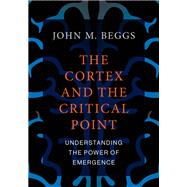How the cerebral cortex operates near a critical phase transition point for optimum performance.
Individual neurons have limited computational powers, but when they work together, it is almost like magic. Firing synchronously and then breaking off to improvise by themselves, they can be paradoxically both independent and interdependent. This happens near the critical point: when neurons are poised between a phase where activity is damped and a phase where it is amplified, where information processing is optimized, and complex emergent activity patterns arise. The claim that neurons in the cortex work best when they operate near the critical point is known as the criticality hypothesis. In this book John Beggs—one of the pioneers of this hypothesis—offers an introduction to the critical point and its relevance to the brain.
Drawing on recent experimental evidence, Beggs first explains the main ideas underlying the criticality hypotheses and emergent phenomena. He then discusses the critical point and its two main consequences—first, scale-free properties that confer optimum information processing; and second, universality, or the idea that complex emergent phenomena, like that seen near the critical point, can be explained by relatively simple models that are applicable across species and scale. Finally, Beggs considers future directions for the field, including research on homeostatic regulation, quasicriticality, and the expansion of the cortex and intelligence. An appendix provides technical material; many chapters include exercises that use freely available code and data sets.








